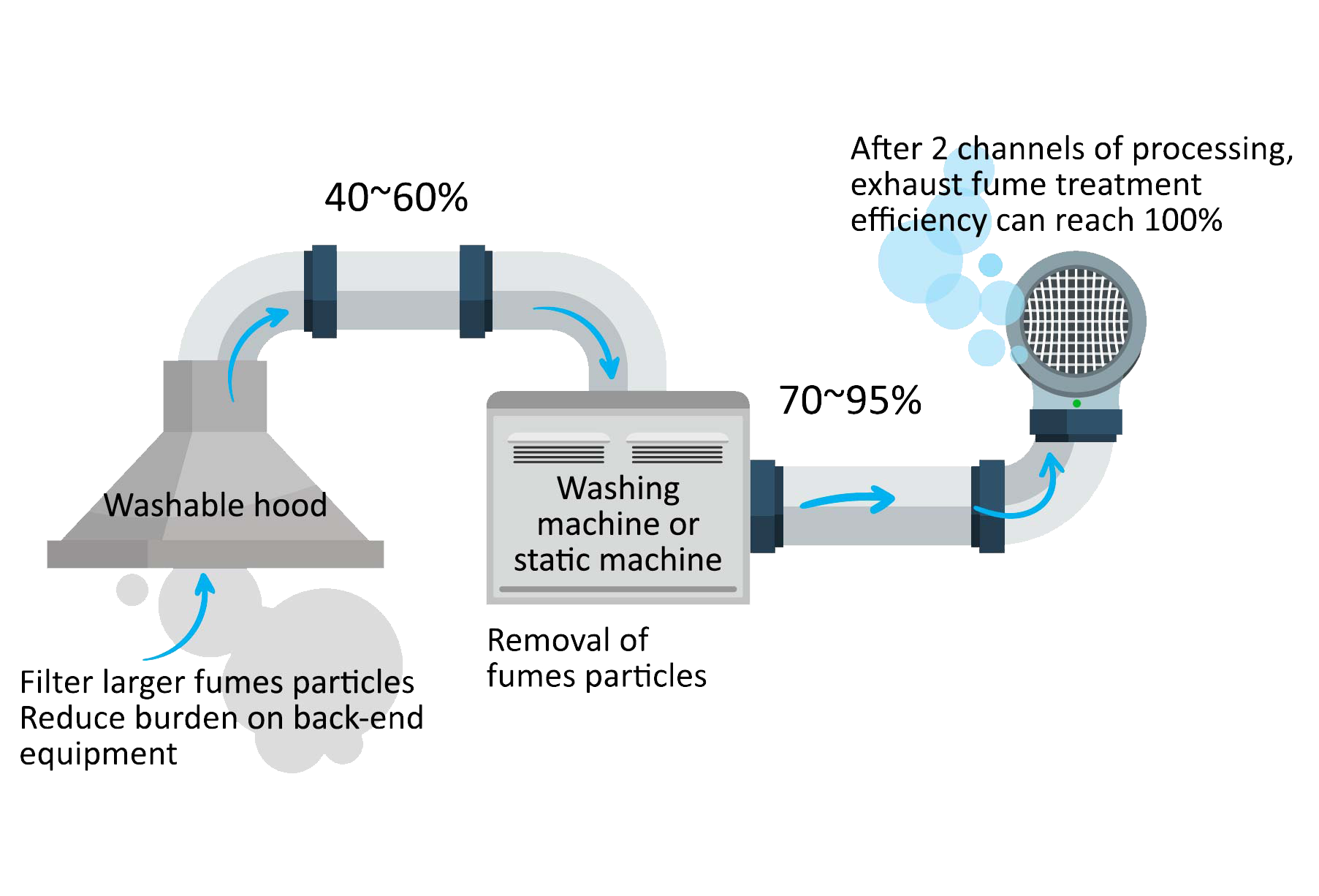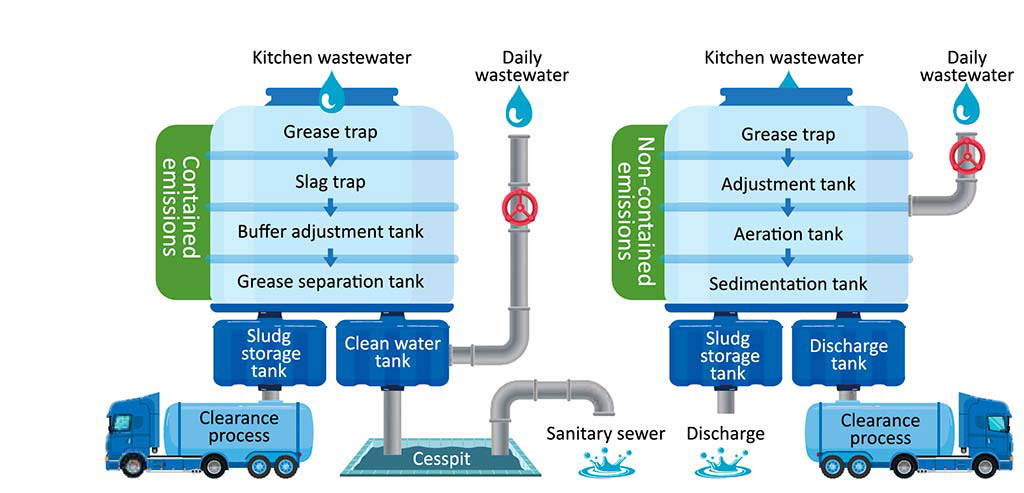Green operation is the environmental management goal of FEDS. We strive to reduce the impact of operations on the environment, and strictly control items such as waste disposal, resource recycling, waste oil fume emission, and waste (sewage) water to reduce environmental pollution. At the same time, we also comply with government policies to promote plastic reduction actions, including restricting the use of plastic shopping bags, plastic straws, disposable tableware etc., to reduce the generation of plastic waste in order to achieve the goal of resource sustainability and zero waste.
Waste Management
Waste Treatment to Reduce Environmental Waste
FEDS regards “garbage, food waste, and waste oil” primarily generated from the day-to-day operation as the focus of department store waste management. We have implemented a classification system in our offices and operating stores to strengthen the classification management of garbage. Waste from the stores has also been cleared and transported in accordance with the law, and qualified vendors are hired to recycle or incinerate waste respectively.
In addition, each branch of FEDS has set up large refrigeration equipment to store kitchen waste to avoid polluting the environment. In 2023, achievements was made in waste management, with waste volume decreasing from the previous year, including decrease in general industrial waste by 6.0%, food waste by 7.2%, and in edible oil waste by 5.1%.
Waste Statistic
- Unit: tons
- Note 1: The Zhubei Store was added in 2022
- Note 2: Food waste has been calculated since 2019 and waste oil has been calculated since 2021.
廢棄物管理流程

Resource Recycling Reached Nearly 5,500 Tons in 5 Years
In order to improve the efficiency of resource recycling and allow recyclable resources to be recycled, FEDS has established resource recycling management indicators for its branches since 2018, and conducted recycling management for paper, the largest recyclable resource produced by these stores. In 2021, FEDS further added recycling projects such as iron and aluminum cans and pet bottles, so as to achieve the sustainable goal of resource recycling. Resource recovery in 2023 reached 1,372 tons, an increase of 4.3%.
Total Amount of Recycling Over The Years
- Unit: tons
- Note: Only recycled paper was calculated prior to 2020. Aluminum cans and pet bottles were added since 2021.
Implementing Waste Oil Fume Management to Ensure Emission Meets the Standard Value
In order to prevent cooking fumes from affecting the living quality of the surrounding neighbors, FEDS adopts a water-purifying fume exhaust hood system instead of a traditional washing machine system. The advantage is that the front of the kitchen is treated with water to prevent the accumulation of grease in the vertical fume exhaust pipe, and can simultaneously have the three functions of kitchen cooling, reduction of air-conditioning fee, and fire prevention. After 2 channels of processing, exhaust fume treatment efficiency can reach 100% and allow emitted exhaust gas to comply with the emission standard value.

- Note: Treatment efficiency values are based on Environmental Protection Administration’s “Food and Beverage Fume Control Equipment Setup Guide”.
Implementing Waste (Sewage) Water Management with Sewer Connection Rate Reaching 78%
In order to dispose waste (sewage) water generated in the stores, FEDS branches are equipped with large grease trap, which can block slag and intercept oil, and add degreasing, deodorizing agent and other appropriate treatment procedures before discharge into the city’s groundwater system. Regarding non-waste (sewage) water, it is also treated as mention above. FEDS has another sewage treatment tank to discharge in compliance with regulatory standards after mixing using biological treatments, sedimentation, dosing, and filtering.
In order to reduce river pollution and maintain a healthy environment, FEDS has launched the sewer connection project, and carried out the “sewer connection” operation procedure for branches that can receive wastewater (sewage) to reduce sewage overflow and odor generation. In the future, FEDS plans to implement the sewer pipe connection operation at the Taoyuan Store and Top City Taichung Store, and move towards a sewer connection rate of 100%.
In addition to the treatment procedures described above, the discharged waste water(sewage) is treated in another sewage treatment tank after mixing using biological treatments, sedimentation, dosing, and filtering. The water is only discharged after meeting the regulatory standards. In addition, FEDS also promotes the sewer connection project, and implements the “sewer connection” operation procedure for branches that can discharge waste (sewage) water through pipes connecting to sewer, so as to reduce the generation of peculiar smell. By the end of 2022, the sewer connection rate of all Taiwan branches has reached 78%. In the future, FEDS plans to implement the sewer connection operation at the Taoyuan Store and Top City Taichung Store, and move towards a 100% sewer connection rate.
污水納管率

Expense Invested in Waste Water (Sewage) Prevention and Treatment
Tip: please scroll horizontally when viewing this page on your mobile device

| Type | Measures | Invested costs | Effectiveness of prevention and treatment |
| Restaurant waste water Domestic sewage | Before connecting the sewer to Hsinchu Store, the water quality of the discharged water is tested | NT$130 thousand | 100% compliance with emission standards |
| Branches that have not yet been connected, sewer connection planning and design | NT$870 thousand | ||
| Wastewater operation and maintenance for all FEDS’s branches in Taiwan | NT$5.37 million |
